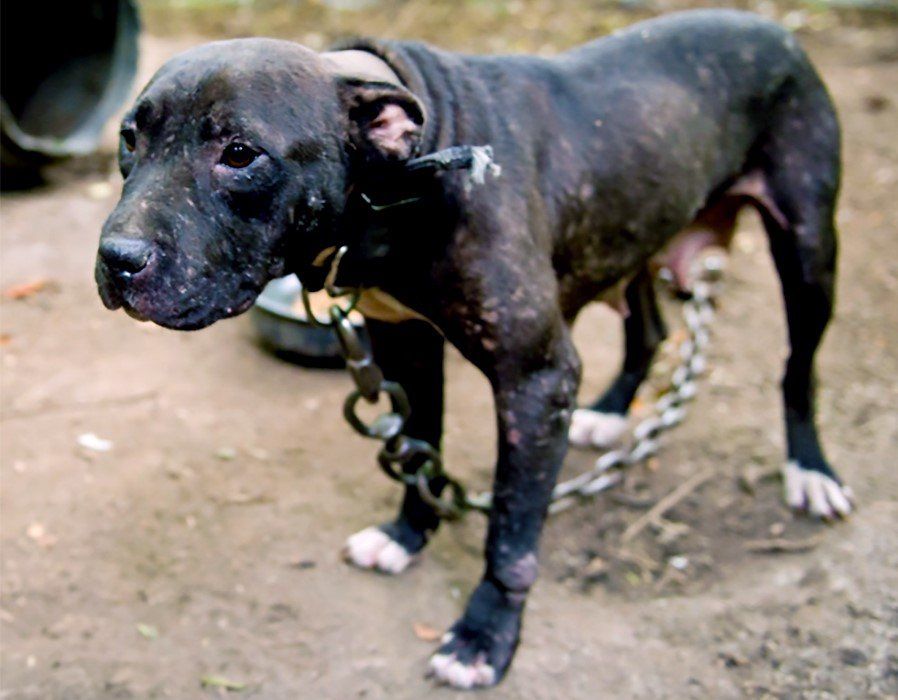What is dog fighting?
Many find it surprising that dog fighting was outlawed nearly 200 years ago. Sadly, it still continues in the 21st century and is a significant animal welfare issue for the UK.
It’s one of the most horrific forms of organised animal cruelty, not only for the violence the dogs endure during fights but because of the trauma they suffer throughout their lives.
Dogs forced to fight suffer terrible injuries, both from the fights and at the hands of their vicious 'owners'. Most will ultimately be killed in the ring or die soon after from their injuries. Those who can no longer fight are often brutally killed. We're standing against dog fighting.
Take a look at our dog fighting case studies for more information.

Scale and prevalence in the UK
Dog fighting is secretive and operates deep underground. It’s difficult – and often dangerous to find information about what’s going on and who’s involved. Our professional investigators work tirelessly to raise awareness and bring those involved to justice. Often this means working in difficult and dangerous situations.
Many indicators show that dog fighting continues to be a significant animal welfare issue in the UK. Figures from the RSPCA show a steady number of calls relating to dog fighting over the last ten years.
We work collaboratively with the public, rescue centres, veterinarians, community groups, law enforcement and politicians to raise awareness, to help communities tackle it and of course to support the animals that have been rescued from this living hell.
Dog fighting in Northern Ireland
Despite the failure to introduce a ban on fox hunting, Northern Ireland has led the way in tackling other forms of animal cruelty. In March 2014, three men were given suspended sentences despite being involved in what was described as one of the “vilest examples of premeditated abuse” of animals, when they set dogs on badgers, cats, and other dogs.
The public and political outcry that followed, as well as lobbying from the League and others, led to the Justice Act 2015, which increased the maximum sentence for animal cruelty to five years imprisonment, and included provision for unduly lenient sentences to be appealed. Despite these successes, the League continues to work to raise awareness of animal cruelty across Northern Ireland, and that these new maximum sentences are used by judges where appropriate.
Dog fighting and links to serious crime
Dog fighting is a horrendous animal welfare issue. Evidence from the UK and internationally points to dog fighting being a ‘gateway’ crime to serious and organised crime. In one case we identified an organised crime group involved in dog fighting who were also involved in firearms, trafficking class A drugs, modern day slavery, money laundering and prostitution.
In other cases we have investigated, there has been potential links to international terrorism and domestic far right extremism, which we shared with the appropriate authorities.
Animal Crimewatch
Dog fighting is extremely challenging to our professional investigators due to the secret and dangerous world in which they must operate, but it remains our second-largest area of work.
Our confidential supporter funded Animal Crimewatch service is at the forefront of our work. We receive reports of suspected dog fighters from members of the public; whether it’s concerns from neighbourhood communities or identifying suspicious social media profiles, it all helps us build the bigger picture and initiate investigations.
One of our largest investigations started following a call to our Animal Crimewatch team. This vital piece of information led to a three-year investigation into the international transportation of dogs bred for fighting which resulted in a BBC expose and the arrest and conviction of a dog fighter in Scotland.
We need your help to end dog fighting in the UK
If you have information about dogfighting contact Animal Crimewatch and you could be eligible for a reward of up to £1,000 for information that directly results in the arrest and conviction of a dog fighter.
Our plan to end dog fighting
Through our investigations and wider campaign effort we want to end dog fighting, which we will achieve by:
- Campaigning for a stronger legislative framework to tackle dog fighting, which treats it as a distinct crime, attracting heavier penalties.
- Consistency in animal abusers receiving appropriate disqualification orders.
- Encouraging Government to initiate offences relating to video recordings of animal fighting. (Sect 8 Animal Welfare Act 2006)
- Encouraging law enforcement to do all they can to tackle dog fighting, treating it more seriously and recognising it as a ‘gateway’ crime.
- Replacement of Breed Specific Legislation (Dangerous Dogs Act 1991) with a system focusing on ‘deed not breed’, as all dogs can be forced to fight.
- Calling for the strengthening of border controls and pet transport rules to prevent the cross-border movement of dogs for fighting.
Help us end dog fighting
Find further information for professionals here.
Report any evidence you have of dog fighting in your area to our Animal Crimewatch team.
Share this page on your social media.
Find out more
We're the UK's leading animal charity working to make cruel sports a thing of the past. We're also working to end fox hunting, cubbing, trail hunting, snares, greyhound racing, dog fighting game shooting, bullfighting, hare coursing, mink hunting, and more.